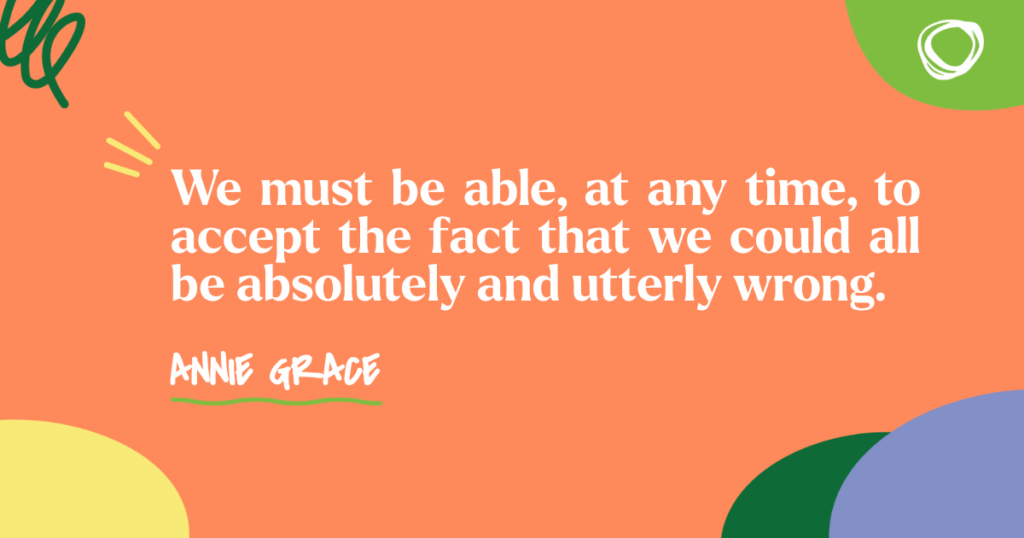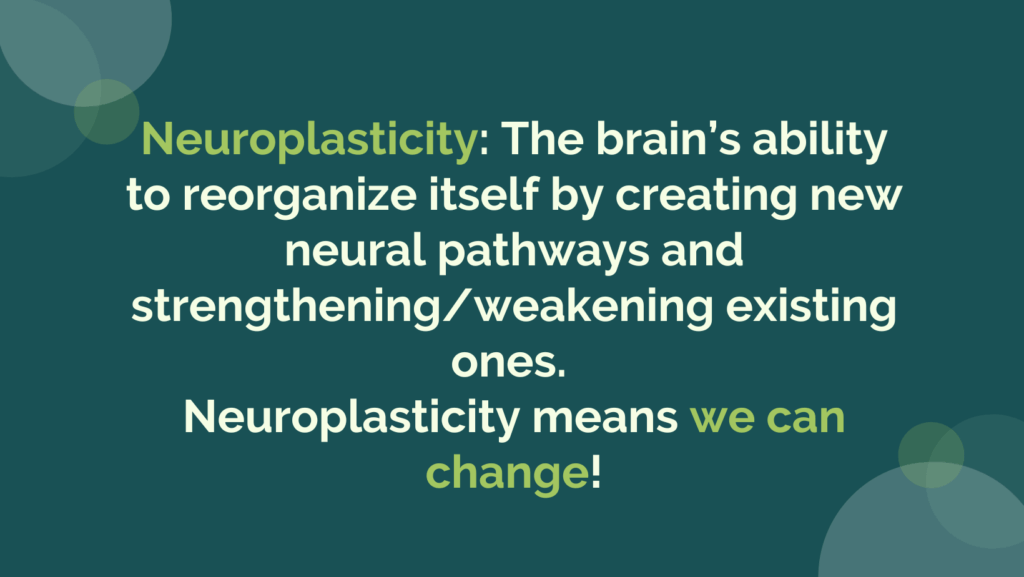
Let’s talk about how to let go of limiting beliefs. When we’re struggling with a habit—alcohol, scrolling, shopping, overworking—we usually try to “fix” the behavior. But change that lasts begins deeper. The real shift happens when we release the belief that’s driving the behavior: the assumption that we need it to relax, belong, cope, celebrate, or feel okay. When we update the belief, the behavior has permission to change—often with far less effort.

TL;DR: Learning how to let go of limiting beliefs isn’t about muscling through behavior change; it’s about gently dismantling the beliefs that keep those behaviors on repeat. When you release limiting beliefs, you create space for forgiveness, mental freedom, and a future that fits. This is the heart of lasting change—and why questioning your beliefs about alcohol through a structured, compassionate process can make new choices feel natural.
Jump Links
Why behavior hacks don’t stick
For years, I treated habits like weeds: keep pulling and eventually they’ll stop coming back. But weeds have roots, and habits have beliefs. If you quit alcohol without examining the belief that it helps you relax, connect, or cope, it’s easy to swap in another behavior—sugar, shopping, overworking. That’s why cross-addictions happen: we change the action but the assumption remains.
Annie Grace: “The majority of drinkers believe they drink because they want to, they enjoy it, and they choose to do it.” That belief, more than the behavior, is what keeps us stuck.
Cognitive Behavioral Therapy (CBT) has long shown that our interpretation of events drives our reactions more than the events themselves. When perception changes, reactions change. If you’re curious, the Beck Institute offers a clear overview of the cognitive model and practical ways to examine and update unhelpful thoughts.
Beliefs: the hidden engine of our habits
Every choice whispers an underlying story:
- “I can’t handle stress without a drink.”
- “I’m the fun one; not drinking makes me boring.”
- “If I say no, I’m selfish.”
These aren’t moral failings; they’re learned strategies to feel safe, accepted, and soothed. When you shift the belief beneath the behavior, change gets lighter. Instead of arguing with yourself every night at 5 p.m., you reshape the inner narrative: “I can decompress in ways that actually leave me rested and proud tomorrow.”
Annie Grace: “When you completely change your mental (conscious and unconscious) perspective on alcohol… no willpower is required, and it becomes a joy not to drink.” Belief first, behavior follows.
Try this belief-shift prompt:
- Notice the moment you feel pulled toward an old behavior.
- Ask: What would I need to believe for this to feel necessary right now?
- Test it: Is that fully true? What else could be true?
- Choose a kinder, truer belief—then take the next smallest aligned action.
Rumination, identity, and the illusion of control
When we feel stuck, we often live in our heads—looping the past and predicting disaster. Psychology calls this rumination: a repetitive, passive focus on distress and its causes without active coping. It’s strongly linked to anxiety and depression. Letting go is, in part, letting go of the mental reruns that keep pain “on repeat.” For an accessible overview of rumination and mental health, see the American Psychological Association and research summaries from academic reviews.
Another sticky layer is identity. If your role was “weekend warrior” or “life of the party,” removing alcohol can feel like removing you. But identity is surprisingly flexible; as beliefs change, identity updates. You’re not losing yourself—you’re pruning what no longer fits so the real you has light to grow.
Annie Grace: “We must be able, at any time, to accept the fact that we could all be absolutely and utterly wrong.” Letting go starts with the humility to reconsider what we’ve believed about ourselves.

Try The Alcohol Experiment
If this resonates, start not with willpower, but with curiosity. The Alcohol Experiment is a free, guided 30-day experience that helps you question beliefs about alcohol in a compassionate, science-based way so change feels natural, not forced. It’s a gentle path for learning how to let go of limiting beliefs about alcohol and create freedom that lasts.
Forgiveness: choosing yourself, not excusing others
Letting go opens surprising doors—especially forgiveness. Forgiveness isn’t saying what happened was okay; it’s choosing you and your peace. Psychologist Everett Worthington’s research shows that forgiveness carries real health and relational benefits, and his REACH model offers a practical roadmap you can try. Learn more about the approach through Greater Good Science Center and Worthington’s work at VCU.
Self-forgiveness matters, too. Many of us punish ourselves for choices we made while clinging to unexamined beliefs. Researcher Kristin Neff defines self-compassion as mindfulness, common humanity, and self-kindness—treating yourself like you would a dear friend when you’re struggling. It’s not indulgence; it’s evidence-based fuel for sustainable change. Explore the research and practices at self-compassion.org.
Dr. Kristin Neff: Self-compassion involves “self-kindness, common humanity, and mindfulness.” Building these components interrupts shame spirals that keep old beliefs alive.
Neuroplasticity: rewiring is real
Good news for the skeptical brain: rewiring isn’t wishful thinking—it’s biology. Neuroplasticity means your brain changes with experience and practice. This idea is often summarized by Hebb’s classic line, “neurons that fire together, wire together.” As you challenge old beliefs and rehearse new ones, your brain updates its pathways, making aligned choices feel more automatic over time. For a clear, evidence-based overview, see this StatPearls review on Neuroplasticity and addiction science at the National Institute on Drug Abuse.
Dr. Aaron T. Beck: Cognitive therapy helps people live “in the present with full meaning and satisfaction”—not shackled to past narratives or future fears. Belief-level change frees behavior to follow.
Annie Grace: I’ve watched this in thousands of lives: the moment the belief changes, the behavior comes along for the ride. That’s why we focus on clarity over control—on truth over willpower.

Two-minute micro-practice to build new pathways:
- Name it: “Old belief: I can’t relax without a drink.”
- Reframe it: “New belief: My body can relax; I’m learning faster, kinder ways.”
- Rehearse it: 3 deep breaths, then a tiny action (stretch, text a friend, step outside).
- Notice the win: Log one benefit you felt (clearer head, calmer mood, better sleep).
Repeat. Repetition signals your brain: this is who we are now.
From “last call” for limits to first steps forward
Here’s the empowering truth: learning to let go sets a precedent. It’s your way of saying, “I’m no longer outsourcing my peace, health, or happiness.” You stop giving the past veto power over your future. You stop negotiating with beliefs that have expired. And you start moving toward what’s next—creative work, new relationships, education you once avoided, or simply mornings that feel clean and unburdened.
Letting go also opens you to potential and to people. When you stop ruminating on the past, you allow for a future: a new career, a hobby you never had time for, friendships that feel safe, love that feels earned because you now believe you deserve it.
Annie Grace: “Now… I can compare my non-drinking self against my former, drinking self… my emotions are one hundred percent mine.” Letting go isn’t just freedom from a behavior—it’s freedom to feel, choose, and create.
“Last call” for limiting beliefs; “boarding call” for a life that’s unapologetically yours. If you’re ready to begin, start with one belief today. Write it down. Challenge it. Replace it with something truer and kinder. Then take one step that aligns with the new belief. That’s the method: belief → micro-action → evidence → identity. Repeat until freedom feels normal.
About Annie Grace
I’m the founder of This Naked Mind and creator of The Alcohol Experiment. My work blends neuroscience, psychology, and compassionate habit change to help people transform their relationship with alcohol and, more importantly, with themselves. I’m not here to shame your choices—I’m here to help you get curious about the beliefs behind them so you can build a life you don’t need to numb.
Further Reading
Copyright © 2025. All rights reserved. This Naked Mind and all associated materials are protected intellectual property. The information provided here is for educational purposes and does not constitute medical advice.


